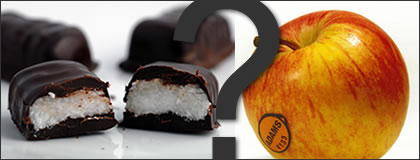
Wouldn’t it be great if we could just spontaneously and automatically exercise self-control, without all that painful back-and-forth battle with ourselves?
Just automatically resist that cake and choose the apple; or suddenly find ourselves out jogging without resorting to self-blackmail; or effortlessly write more articles for our websites (bit of a personal one there!).
Unfortunately so often temptation wins. And experiments show that when we are run down from exercising self-discipline all day, we become even more likely to give in to temptation.
Apple or candy bar?
I’ve previously covered research here suggesting that self-control can be increased by thinking abstractly about our goals. This suggests we should see our actions as just one part of a larger plan, rather than focusing on the details of what we’re doing. The power of abstract thinking may offer a way for us to increase our self-control without really trying.
But how does thinking abstractly about our goals increase our self-control? In a recent article published in Psychological Science, Fujita and Han (2009) wondered if our unconscious mind is somehow pitching in to help out. They used an implicit association test as a way of measuring people’s unconscious thoughts about eating either an apple or a tempting candy bar.
Before taking this test people were put into either an abstract or concrete mode of thinking. Participants were split into two groups with each asked to think about maintaining good personal relationships, but in different ways. One group thought about why we need to maintain good relationships (abstract, high-level) while the other focused on how we maintain good relationships (concrete, low-level).
As you can see, for the purposes of this experiment, the reason participants were thinking abstractly didn’t matter so much. That’s because when we think abstractly about one thing, we tend to carry on thinking in an abstract mode about anything else that’s put in front of us, including the choice between an apple and a candy bar.
Automatic, unconscious self-control
The results showed that, when participants were thinking concretely, they tended to unconsciously see candy bars in a positive light and apples in a negative light. But this was reversed when participants were thinking abstractly. Just as predicted, abstract thinking automatically made people unconsciously think of candy bars as the devil’s own food.
To back this up they asked participants in the two conditions whether they would like an apple or a candy bar, right now. They found that when participants were thinking in a concrete low-level way, they chose the apple over the candy bar only 50% of the time. But when they were thinking abstractly this percentage shot up to 76%. Not bad for such a simple manipulation.
So it seems you can bolster resistance to temptation by thinking abstractly about the goal you want to obtain because it causes your mind to automatically associate temptations with negativity. Hey presto, more self-control and thank you unconscious mind.
Why not try applying this to whatever you are finding difficult to achieve?
